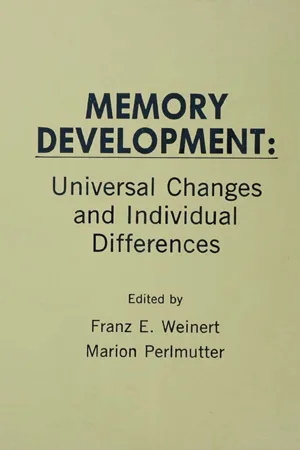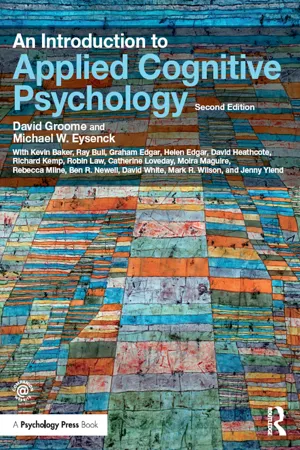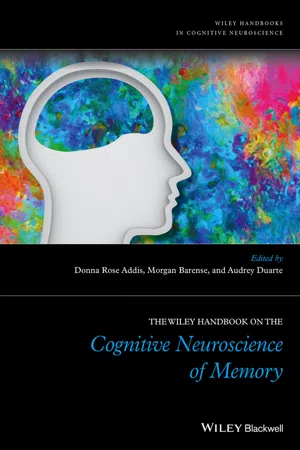Psychology
Improve Memory
Improving memory involves enhancing the brain's ability to encode, store, and retrieve information. Strategies for improving memory include practicing mindfulness, getting adequate sleep, engaging in regular physical exercise, and using mnemonic devices. Additionally, maintaining a healthy diet, managing stress, and engaging in cognitive activities can also contribute to memory improvement.
Written by Perlego with AI-assistance
Related key terms
1 of 5
5 Key excerpts on "Improve Memory"
- eBook - ePub
Memory Development
Universal Changes and Individual Differences
- Franz E. Weinert, Marion Perlmutter, Franz E. Weinert, Marion Perlmutter(Authors)
- 2013(Publication Date)
- Psychology Press(Publisher)
It may be that so many researchers have been attracted to the study of memory development because this topic has in recent years awakened great interest among the general public as well as within the scientific community. There was a time when, in relation to intellectual abilities, memory was held to be a more humble mental faculty and extraordinary feats of memory were more the object of ironical quips than admired. Today, however, rich knowledge, intelligent learning, and proficient memory are rated highly. Presumably one reason for this is the constant increase in the amount of information that people must encode, process, and store. This reappraisal of the role of memory may also stem from the demands formal education makes in childhood and youth, and from the increasingly demanding tasks of life-long learning. For many people, therefore, poor memory is a serious problem. Empirical findings from studies conducted across different countries indicate that although poor memory is certainly a predicament for elderly adults, it is not limited to them.Although pills, popular books, and training programs are enjoying a boom, most of these offers are ineffective at improving memory, and some of them are not even good placebos. Partly as a result of this trend, public opinion has come to expect that memory research will provide the solutions to practical problems.Such expectations are consonant with the hopes (and promises) of many researchers. Their assumption is that adequate theoretical explanations of the functioning of human memory will also yield information that could be applied to improving memory performance. A number of recent studies have demonstrated that training in the effective use of mnemonic strategies does actually Improve Memory performance (Pressley et al., this volume), although not as effectively as expected (Büchel, this volume).Thus, study of the structures, processes, and functioning of the memory system continues to be a fundamental endeavor of cognitive psychology in the expectation that the findings will advance theoretical ideas and produce practical benefits. The study of memory development plays a significant role in this endeavor. Systematic observation of the ways in which changes in cognitive resources across the life span affect different types of memory performance is likely to encompass a greater range of phenomena than can be obtained in laboratory investigations with adult subjects. In addition, cross-cultural comparisons and training studies allow the investigation of the plasticity of human memory systems. Such studies have the particular value of providing a basis on which instructional treatments and teaching demands can be adjusted to the developmental levels achieved by the learners. - Available until 8 Jun |Learn more
- David Groome, Michael Eysenck(Authors)
- 2016(Publication Date)
- Psychology Press(Publisher)
Memory improvement 6 David Groome and Robin Law 6.1 INTRODUCTIONMost of us would like to have a better memory. The ability to remember things accurately and effortlessly would make us more efficient in our daily lives, and it would make us more successful in our work. It might also help us socially, by helping us to remember appointments and avoiding the embarrassment of forgetting the name of an acquaintance. Perhaps the most important advantage, however, would be the ability to study more effectively, for example when revising for an examination or learning a new language. While there are no magical ways of improving the memory dramatically overnight, a number of strategies have been developed that can help us to make worthwhile improvements in our memory performance, and for a few individuals the improvements have been quite spectacular. In this chapter, some of the main principles and techniques of memory improvement will be reviewed and evaluated in the light of scientific research. This will begin with a review of the most efficient ways to learn new material and the use of mnemonic strategies, and will then move on to consider the main factors influencing retrieval.6.2 LEARNING AND INPUT PROCESSING MEANING AND SEMANTIC PROCESSINGOne of the most important principles of effective learning is that we will remember material far better if we concentrate on its meaning, rather than just trying to learn it by heart. Mere repetition or mindless chanting is not very efficient. To create an effective memory trace we need to extract as much meaning from it as we can, by connecting it with our store of previous knowledge. In fact this principle has been used for centuries in the memory enhancement strategies known as mnemonics, which mostly involve techniques to increase the meaningfulness of the material to be learnt. These will be considered in the next section. - Donna Rose Addis, Morgan Barense, Audrey Duarte(Authors)
- 2015(Publication Date)
- Wiley-Blackwell(Publisher)
A comprehensive systematic review of this litera- ture would exceed the limits of the present chapter, and so we set out to provide an overview of key issues and findings. The focus will be on remediation of declarative memory (i.e., memory for events, information, etc. that one can consciously recall/ describe) and prospective memory (i.e., remembering to carry out tasks at the right time). When considering the evidence that a particular intervention is better than none, we will avoid considering results from studies that failed to include either a con- trol group or multiple baseline measures (i.e., those where post‐training gains could simply be the result of test–retest practice effects). Because there have been so few neuroimaging studies investigating the effects of interventions in neurological patients, we will consider functional imaging results from memory interventions in both patients and healthy subjects. To date, most interventions used with neurological patients have involved teaching strategies to Improve Memory. This includes internal/mental strategies, external memory aids, and more holistic/diversified training that incorporates a range of strategies as well as psychoeducation. In this chapter, we will first review the results of strategy training in terms of memory outcome and, where possible, in terms of neuroimaging findings. Next, baseline factors that influence the results from these types of interventions will be examined. Lastly, we will consider the more limited outcome results from some newer interventions (i.e., physical exercise, computerized training). Strategy Training Results from traditional studies in experimental psychology have informed the design of interventions centred on teaching memory strategies.- eBook - PDF
- Catherine A. Sanderson, Karen R. Huffman(Authors)
- 2016(Publication Date)
- Wiley(Publisher)
© evemilla/iStockphoto © John Cooke/iStockphoto 174 The Nature of Memory 175 7.1 The Nature of Memory LEARNING OBJECTIVES Retrieval Practice While reading the upcoming sections, respond to each Learning Objective in your own words. Summarize the key factors, research findings, and major models of memory. • Define memory and its constructive process. • Discuss the two major memory models. • Explain the function and process of sensory memory. • Review the core principles of short-term memory (STM) and how it compares to working memory. • Describe the core features, functions, and various types of long-term memory (LTM), and how to improve it. Memory is learning that persists over time. It allows us to learn from our experiences and to adapt to ever-changing environments. Without it, we would have no past or future. Yet our memories are highly fallible. Although some people think of memory as a gigantic library, or an automatic video recorder, our memories are not exact recordings of events. Instead, mem- ory is highly selective (Baddeley et al., 2015; Chen & Wyble, 2015; Matlin & Farmer, 2016). As discussed in Chapter 5, we only pay attention to, and remember, a small fraction of the information we’re exposed to each day. Perhaps most important, memory is a constructive process through which we actively organize and shape information as it is being encoded, stored, and retrieved (Herriot, 2014; Karanian & Slotnick, 2015; Robins, 2016). As expected, this construction often leads to serious errors and biases, which we’ll discuss throughout the chapter. Would you like personal proof of the constructive nature of your own memory? See the following Psychology and You. Memory The persistence of learning over time; process by which information is encoded, stored, and retrieved. Constructive process The process of organizing and shaping information during encoding, storage, and retrieval of memories. - eBook - PDF
- John Cavanaugh, Fredda Blanchard-Fields(Authors)
- 2018(Publication Date)
- Cengage Learning EMEA(Publisher)
Memory improvement can also be an outcome of other forms of training that engage cognitive processes, such as training older adults to use iPads (Chan et al., 2016). Memory aids or strategies can be organized into meaningful groups. Among the most useful of these Training Memory Skills The notion memory can be improved through acquir- ing skills and practicing them is old, dating back to pre- history (Yates, 1966). For example, the story related in The Iliad was told for generations through the use of mnemonic strategies before it was finally written down. Self-help books teach readers how to improve their own memory have also been around for a long time (e.g., Grey, 1756). Interestingly, the old how-to books taught tech- niques virtually identical with those advocated in more contemporary books such as those generated by Harry Lorayne, who is profiled in the Real People feature. Training people how to remember information bet- ter, especially through the use of memory strategies, can be aimed at any adult. As you may have realized in our earlier discussion about memory strategies, most of the best strategies share several things in common. First, Real People The Yoda of Memory Training I f you are like most people, you probably have trouble remembering the names of every person you meet. Not Harry Lorayne (born 1926). Harry was able to meet as many as 1,500 people for the first time, hear their name once, and remember each one perfectly. The book Age- less Memory (2008) is the culmination of his more than 40-year career training people how to remember informa- tion and dazzling audiences with his own abilities. Thou- sands of people bought his books and videos and attended his programs. Time Called him the “Yoda of memory training” (Kluger, 2000).
Index pages curate the most relevant extracts from our library of academic textbooks. They’ve been created using an in-house natural language model (NLM), each adding context and meaning to key research topics.




